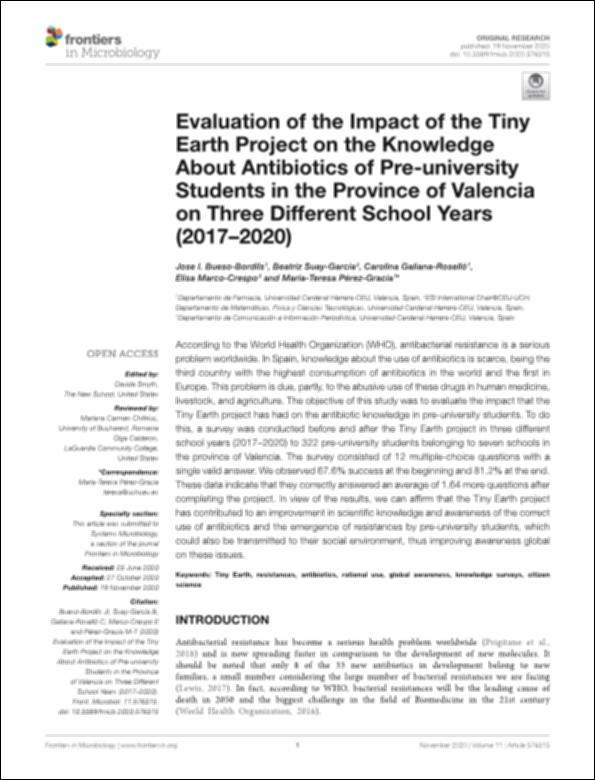Por favor, use este identificador para citar o enlazar este ítem:
http://hdl.handle.net/10637/12574Evaluation of the impact of the Tiny Earth Project on the knowledge about antibiotics of pre-university students in the province of Valencia on three different school years (2017-2020)
| Título : | Evaluation of the impact of the Tiny Earth Project on the knowledge about antibiotics of pre-university students in the province of Valencia on three different school years (2017-2020) |
| Autor : | Bueso Bordils, José Ignacio Suay García, Beatriz Galiana Roselló, Carolina Marco Crespo, Elisa Pérez Gracia, María Teresa. |
| Materias: | Antibiotics.; Educación sanitaria.; Health education.; Science - Social aspects.; Sociología de la ciencia.; Antibióticos.; Drug resistance in microorganisms.; Bacterias - Resistencia a los medicamentos. |
| Editorial : | Frontiers Media |
| Citación : | Bueso-Bordils, J.I., Suay-García, B., Galiana-Roselló, C., Marco-Crespo, E. & Pérez-Gracia, M.T. (2020). Evaluation of the impact of the Tiny Earth Project on the knowledge about antibiotics of pre-university students in the Province of Valencia on three different school years (2017–2020). Frontiers in Microbiology, vol. 11, art. 576315 (19 nov.). DOI: 10.3389/fmicb.2020.576315 |
| Resumen : | According to the World Health Organization (WHO), antibacterial resistance is a serious problem worldwide. In Spain, knowledge about the use of antibiotics is scarce, being the third country with the highest consumption of antibiotics in the world and the first in Europe. This problem is due, partly, to the abusive use of these drugs in human medicine, livestock, and agriculture. The objective of this study was to evaluate the impact that the Tiny Earth project has had on the antibiotic knowledge in pre-university students. To do this, a survey was conducted before and after the Tiny Earth project in three different school years (2017–2020) to 322 pre-university students belonging to seven schools in the province of Valencia. The survey consisted of 12 multiple-choice questions with a single valid answer. We observed 67.6% success at the beginning and 81.2% at the end. These data indicate that they correctly answered an average of 1.64 more questions after completing the project. In view of the results, we can affirm that the Tiny Earth project has contributed to an improvement in scientific knowledge and awareness of the correct use of antibiotics and the emergence of resistances by pre-university students, which could also be transmitted to their social environment, thus improving awareness global on these issues. |
| Descripción : | Este artículo se encuentra disponible en la página web de la revista en la siguiente URL: https://www.frontiersin.org/articles/10.3389/fmicb.2020.576315/full |
| URI : | http://hdl.handle.net/10637/12574 |
| Derechos: | http://creativecommons.org/licenses/by/4.0/deed.es |
| ISSN : | 1664-302X (Electrónico). |
| Fecha de publicación : | 19-nov-2020 |
| Centro : | Universidad Cardenal Herrera-CEU |
| Aparece en las colecciones: | Dpto. Farmacia |
Los ítems de DSpace están protegidos por copyright, con todos los derechos reservados, a menos que se indique lo contrario.


